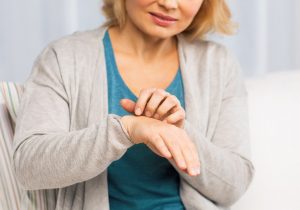
August is Psoriasis Action Month
If you notice thick, red, scaly, and itchy patches appearing on your skin, you may have a skin condition called psoriasis, but the problem is more than skin deep. While psoriasis is widely considered to be an irritating skin disorder, this is only scratching the surface because it’s a chronic autoimmune disease. Psoriasis causes skin cells to build up rapidly into bumpy, red patches covered with silvery scales known as plaques. These scaly patches can appear anywhere on the body, but usually show up on the elbows, knees, and scalp. Most people experience cycles of psoriatic symptoms all throughout their lives, often flaring up for a couple of weeks before going into remission for a time. Since the scaly plaques can reappear at any time, psoriasis causes great embarrassment and self-consciousness. In an effort to clear up misconceptions about this common skin disorder, August has been designated Psoriasis Action Month. Bringing awareness and understanding to this chronic condition can hopefully help erase the stigma, stress, and shame that those suffering from psoriasis often face.
Nobody’s immune to psoriasis
Anyone can develop psoriasis at any age. In fact, this autoimmune disorder affects more than 7.5 million adults in the United States, which is around 3% of America’s total adult population. While psoriasis is most common in adults, children can get it too. Psoriasis is an autoimmune disease, which means that your immune system suddenly becomes overactive and attacks your healthy cells. As a result, psoriasis isn’t contagious and cannot be passed through contact with those who have it. However, there are some medical and lifestyle factors that may increase your risk of developing the condition. These risk factors include a family history of psoriasis, stress, anxiety, skin injuries, viral and bacterial infections, obesity, smoking, alcohol, and cold temperatures.
A breakdown of the types of psoriasis
Just as psoriasis is rarely a one-time disorder, there is more than one type of psoriasis. There are many different types of psoriasis. It’s even possible to suffer from more than just one variation during your lifetime. Each type can be recognized by its appearance and location. The five most common types of psoriasis include:
- Plaque psoriasis – This is the most common type, affecting nearly 80% of sufferers. Raised, scaly, and painful plaques can emerge anyplace on the body, yet most frequently appear on the scalp, elbows, knees, and lower back.
- Inverse psoriasis – Affecting close to 25% of sufferers, signs of inverse psoriasis include red, itchy, painful skin that is smooth rather than scaly. It tends to appear in skin folds on the body, such as the underarms and buttocks.
- Guttate psoriasis – Striking approximately 8% of sufferers, this variety is distinguished by small, red, round spots on the arms, legs, and torso that result from inflammation.
- Pustular psoriasis – This type of psoriasis is experienced by 3% of sufferers and features painful, pus-filled bumps surrounded by red, swollen skin either all over the body or only on certain parts.
- Erythrodermic psoriasis – This rare variety affects only 2% of sufferers, yet causes extreme redness and flaking of the skin in large sheets. It usually covers the entire body and causes intense itching, pain, dehydration, and changes in heart rate.
Common psoriatic symptoms
The symptoms of psoriasis are impossible to ignore and depend on the type of psoriasis you have. These symptoms can flare up and clear up at any time, and range from mild to severe. The most common signs and symptoms include:
- Patches of red, inflamed skin covered by thick, silvery scales
- Soreness surrounding the patches
- Itching and burning around the patches
- Dry, cracked skin that may itch or bleed
- Thickened, pitted nails
- Stiff, swollen joints
A variety of psoriasis treatment options
Although there is no cure for psoriasis, there are several kinds of psoriasis treatment that may help you control and cope with the symptoms. These treatments are designed to help slow the growth of skin cells, soothe inflammation, and remove flaky scales. If you have psoriasis, your SignatureMD-affiliated doctor may recommend either one, or a combination, of these psoriasis treatment options:
- Topical creams
- Steroid creams
- Salicylic acid
- Retinoids
- Vitamin D3 ointments
- Anthralin creams
- Moisturizers for dry skin
- Coal tar
- Medicated shampoos
- Light therapy
- Oral medications
- Injected medicines
- Stress reduction techniques
- Salt baths
- Aloe vera creams
- Healthy diet
While psoriasis isn’t contagious, awareness and understanding certainly are. Psoriasis Action Month strives to bring attention, compassion, and support to those suffering from this chronic condition by clearing up misconceptions and promoting the need for a cure that can hopefully clear up psoriasis altogether.